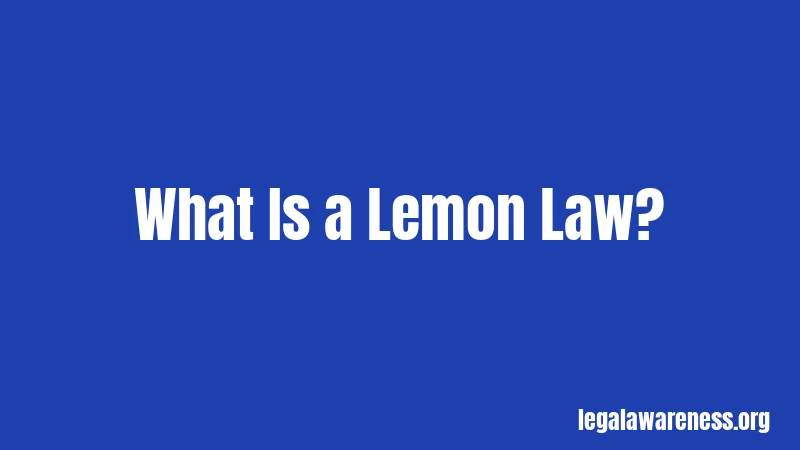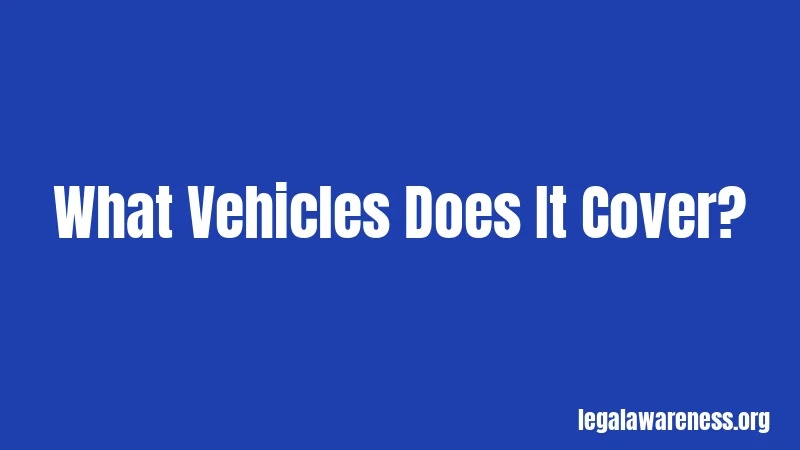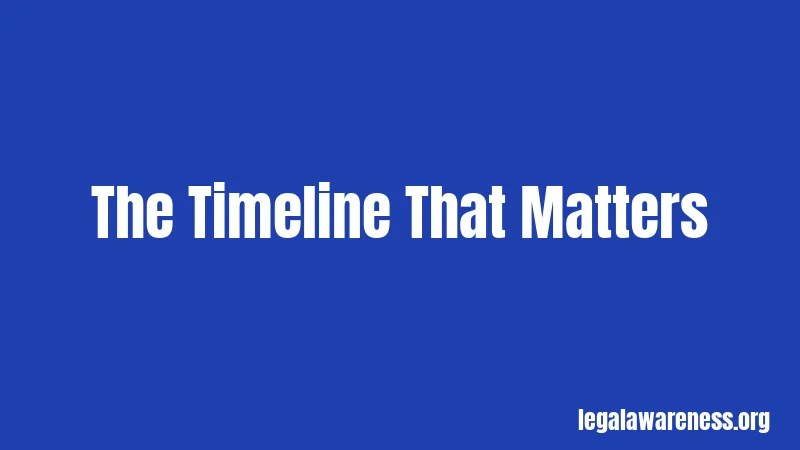Arizona Lemon Laws (2026): Your Complete Protection Guide
You just bought a brand new car. You were excited. Then the problems started. Maybe it’s a transmission issue. Maybe the engine keeps misfiring. Whatever it is, you’re frustrated. Here’s the good news: Arizona has strong laws protecting you.
Most people have no idea these protections even exist. Seriously. You think you’re stuck with a broken car. But Arizona’s lemon laws might be your ticket out. Let’s break down exactly what you need to know.
What Is a Lemon Law?

A lemon law protects you when you buy a new vehicle that turns out to be defective. The idea is pretty straightforward: you paid for a working car. If the manufacturer can’t fix it after a reasonable number of tries, they have to buy it back or replace it.
Think of it like a guarantee that what you bought is actually worth what you paid for it. That’s honestly how it should be, right?
Arizona’s Lemon Law Basics
Arizona’s lemon law is found in Arizona Revised Statutes sections 44-1261 through 44-1267. Sound fancy? It’s really just the state’s way of saying: if your new car is broken and they can’t fix it, you have rights.
Here’s what makes Arizona’s law strong: the manufacturer has to pay your lawyer’s fees if you win. This means you can get legal help without paying out of pocket. That’s actually rare in other states.
What Vehicles Does It Cover?

Arizona’s lemon law protects you if you own almost any motor vehicle. We’re talking about cars, trucks, SUVs, and motorcycles. It even covers the chassis or drivetrain of motor homes.
What doesn’t it cover? Vehicles sold at public auction. Also, vehicles over 10,000 pounds don’t qualify. And here’s an important one: if you bought the car to resell it, you’re not protected. This law is just for people like you who buy a car to drive.
Used vehicles get some protection too, but it’s more limited. You need to still be under the original manufacturer’s warranty. And you have to be within two years or 24,000 miles of when the car was first delivered. Whichever comes first.
When Does a Car Count as a Lemon?
Now here’s the key question: when is your car actually a “lemon” under Arizona law?
Your vehicle qualifies if one of two things happens. First, the same defect has been fixed four or more times. And it still isn’t fixed. Second, your car has been in the shop for 30 or more days total. The days don’t have to be for the same problem.
You’re probably noticing something here. You don’t need both conditions. Just one of them matters. Either four repairs for the same issue, OR 30 days out of service. One triggers the law.
Wait, there’s one more important piece. The defect has to actually hurt the car’s use or value. It can’t be something minor. It has to be something that seriously impacts your ability to drive safely and reliably on Arizona roads.
Still not sure if your situation qualifies? Don’t worry. Even if you don’t hit these exact numbers, you might still have a case. The law says a “reasonable number of attempts” triggers protection. If average people would think your repair history is unreasonable, you might still have rights.
The Timeline That Matters

Here’s where timing gets critical. You have a specific window to take action.
For new vehicles, you have two years or 24,000 miles from when you first got the car. Whichever comes first. During this time, you need to report the defect to the manufacturer, dealer, or warranty issuer. You’ve got six months after that window closes to file a claim. Miss this deadline, and you’re out of luck.
Think of it like this: report the problem within 24 months or 24,000 miles. Then you have another six months to pursue your case. That gives you plenty of time if you catch it early.
What Happens When You Report a Problem
Okay, so your car is definitely broken. And you’ve figured out it might be a lemon. What’s next?
First, tell the manufacturer or dealer about the problem. You can do this in person or by mail. Keep records of everything. Dates, what was wrong, how long it took to fix. This matters.
The manufacturer then gets a chance to fix it. Even if your warranty expires, they still have to try. They’ll attempt to repair the defect. If they can’t fix it after the reasonable number of attempts, that’s when your legal protections kick in.
Here’s what’s important: you want to give the manufacturer written notice after your third failed repair attempt. Or sooner if the defect is a serious safety risk. Send it by certified mail. This creates a paper trail that proves you did your part.
The manufacturer then has 10 days to respond. If they fail to respond or fail to complete repairs within 10 days of receiving your car, your protections become even stronger.
What You Get If You Win
Let’s talk about the good part. If your car qualifies as a lemon and the manufacturer won’t fix it, what are you actually entitled to?
You have two main options. First, the manufacturer has to replace your vehicle. You’ll get a comparable new car. It’ll be basically the same as your old one, just without all the problems.
Second option: they buy it back. You get a full refund of the purchase price. That includes everything you paid for, like warranties or service plans. The only reduction is a reasonable allowance for your use of the car. Think of this as a depreciation charge. You drove it, so it’s worth less than brand new.
Here’s the best part: if you win your case, the manufacturer pays your lawyer’s fees. You’re not out that money. This is why you can actually afford to fight this.
How to Actually Get Repairs Done
You don’t have to go to court immediately. In fact, most cases settle without court.
Work directly with the manufacturer’s customer service department. Use their process outlined in the warranty manual. Be polite but firm. Document everything.
Many manufacturers have dispute resolution programs. There’s something called BBB AUTO LINE. It’s a free, independent way to resolve disputes without going to court. Your manufacturer might participate.
If you want more firepower, hire a lemon law attorney. Look for someone experienced in Arizona lemon law specifically. Many work on contingency. That means they don’t get paid unless you win.
Used Car Protection (It’s Limited)
Remember we mentioned used cars? The protection is definitely real but much narrower.
If you bought a used car, it still needs to be under the original manufacturer’s warranty. And you need to be within two years or 24,000 miles. The warranty must have implied merchantability. That’s just a fancy way of saying the car has to work safely and reliably.
You’ve got 15 days after you take delivery of the car. Or 500 miles. Whichever comes first. During this short window, if something major is wrong, you can potentially use the lemon law.
The manufacturer has to fix the issue. But here’s the key difference: for used cars, you might have to pay up to $25 for each of the first two repairs. This is different from new cars where repairs are usually free.
When You Can’t Use the Law
Certain situations aren’t covered. Let’s be clear about what the law doesn’t protect.
If the problem came from abuse, misuse, or neglect, the law doesn’t help. Off-road use? Not covered. Racing your car? That’s on you. Failure to do regular maintenance? The law says that’s your responsibility.
Also, if you went way past the two-year or 24,000-mile mark before reporting the problem, you’re past the deadline. Leased vehicles usually aren’t covered unless your lease specifically mentions lemon law protection.
Finally, vehicles over 10,000 pounds don’t qualify. And vehicles from public auctions are excluded.
Recent Changes and Important Info
Arizona’s lemon law has been pretty stable in recent years. The main thing that changed was they clarified how the repair presumptions work for newer model year vehicles.
For 2022 and newer vehicles, four repairs of the same problem triggers presumption. Even if it’s only four days in the shop. For older models, the rules are slightly different, but the basic protection stays the same.
The key here is that Arizona regularly updates how the law works in practice. That’s why you should talk to someone current on these changes if you’re considering a claim.
Special Situations
What if you’re not the original owner? Too bad. The law only protects the person who originally bought the car. If you inherited or bought a used car from someone else, you lose the original manufacturer’s warranty protection for lemon law purposes.
What if you leased the car? Generally, leases aren’t covered. But here’s the thing: read your lease agreement. Some manufacturers include lemon law protection in their leases. Check before you assume you’re out of luck.
What about electric vehicles or new technology cars? Good news. They’re covered under the same lemon law. Whatever defects appear, the manufacturer still has to fix them or buy them back.
How to Track Your Case
Stay organized from day one. Create a folder (digital or physical) for everything.
Include repair invoices, warranty information, and all correspondence with the dealership or manufacturer. Write down dates and times of conversations. Note what the problem was and what they promised to do.
When you take your car in for service, ask for written confirmation of the problem and what was done to fix it. Don’t rely on verbal promises. Get it in writing.
This documentation becomes your power. If you eventually pursue a claim, this is your evidence that you gave the manufacturer a reasonable chance to fix the car.
When to Call a Lawyer
You should seriously consider legal help if:
Your car meets the lemon law criteria (four repairs of the same issue or 30+ days in the shop).
The manufacturer hasn’t fixed the problem after reasonable attempts.
You’ve documented everything and the manufacturer isn’t responding.
You want help navigating the process.
Many lemon law attorneys will review your case for free. They won’t charge you unless you win. This is worth doing because they know the system and often get results faster.
Frequently Asked Questions
Can I sell a lemon car to someone else? You can sell it, but you should probably tell the buyer about the defects. Selling a car you know is defective without disclosing that can create legal problems for you.
What if the manufacturer fixes the problem after several attempts? Once it’s fixed, the lemon law protection goes away. But if the same problem comes back repeatedly, you’re back to counting repairs.
Does my extended warranty help with lemon law claims? Sometimes. If your extended warranty covers the defect, the manufacturer has to fix it under both warranties. This actually makes your case stronger.
Can I get money for the inconvenience and hassle? Yes. Beyond the buyback or replacement, you might recover cash for diminished value, incidental damages, or consequential damages. Your attorney can explain what applies to your situation.
How long does a lemon law case actually take? Most settle within a few months. Court cases take longer, sometimes a year or more. But remember, you get attorney’s fees either way if you win.
Final Thoughts
Arizona’s lemon law exists because your state understands something important: when you buy a new car, it should actually work. If it doesn’t and the manufacturer can’t fix it, you shouldn’t be stuck.
You have real rights under Arizona law. These protections are strong. The manufacturer pays your lawyer. You can get your money back or a replacement vehicle.
If you think you have a lemon, start documenting everything now. Report the problem to the manufacturer. Give them a chance to fix it. If they fail after reasonable attempts, get professional help.
The worst thing you can do is nothing. Don’t assume you’re stuck. Don’t think it’s too much trouble. Arizona’s law exists to help you. Use it.
References
Arizona Revised Statutes Sections 44-1261 to 44-1267
Arizona Secretary of State Lemon Law Guide
BBB AUTO LINE Arizona Lemon Law Information
